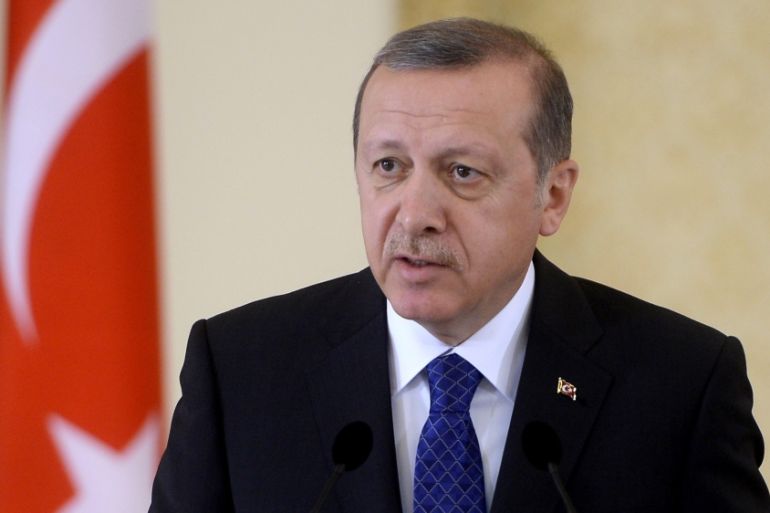Erdogan in Tehran: It is not all about the economy
The Turkish president’s visit aims to get assurances about Iran’s regional politics, observers say.

Tehran – Turkish President Recep Tayyip Erdogan is visiting Tehran on Tuesday amid strong criticism from Iranian politicians over his recent anti-Iran remarks, with several lawmakers having demanded that Erdogan call off his visit.
Erdogan, the first Turkish president to visit Tehran in four years, was expected to exchange views on bilateral relations and issues of mutual interest with President Hassan Rouhani, according to a joint statement issued by Tehran and Ankara on Saturday.
Keep reading
list of 4 itemsTurkish opposition wins major cities in local elections
What shapes Turkey’s municipal elections?
Turkey offers to host Russia-Ukraine peace talks as Erdogan hosts Zelenskyy
The Turkish president was also scheduled to meet Iran’s Supreme Leader, Ayatollah Ali Khamenei. Erdogan, who will be heading a high-ranking delegation of Turkish ministers, was to participate in the second joint meeting of the Iran-Turkey High Council of Strategic Cooperation, the statement noted. The first meeting of the council was held during Rouhani’s visit to Ankara in June of 2014.
OPINION: Iran nuke deal may fuel Turkey’s pipe dreams
The visit comes against a backdrop of tension between the two countries. Late last month, Erdogan declared his support for a Saudi-led military operation in Yemen targeting Houthi rebels, and suggested the group’s links to Tehran were evidence of Iranian ambitions.
“Iran is trying to dominate the region… This has begun annoying us, Saudi Arabia and the Gulf countries. This is really not tolerable and Iran has to see this,” Erdogan said at a press conference on March 26.
He later implied in a television interview that Iran had forces inside Yemen, saying that “Iran and the terrorist groups must withdraw”.
Although Iran’s economic prospects after the tentative nuclear deal in Switzerland with P5+1 and the final deal expected to be signed in June have special appealing attractions for Turkey, it seems that Erdogan and his ministers are visiting Tehran mainly to get assured about Tehran’s regional stances and remove ambiguities fanned by certain Arab states.
Tehran supports the Houthis but denies giving them military support or having Iranian forces in Yemen.
Iran’s foreign minister was quick to respond to Erdogan’s remarks, accusing the Turkish president of fomenting strife in the Middle East and rebuffing his accusation that Iran was trying to dominate the region.
“It would be better if those who have created irreparable damages with their strategic blunders and lofty politics would adopt responsible policies,” Mohammad Javad Zarif said last week, while attending negotiations on Iran’s disputed nuclear programme in Switzerland.
“Under the current circumstances, all countries must work toward establishing stability and preventing the spread of insecurity in the region.”
WATCH: Erdogan: Turkey’s role in the Middle East
Ironically, both Turkey and Iran maintain strong economic ties, with the sanctions-hit Iran being the second-largest gas supplier to energy-strapped Turkey, providing it with 10 billion cubic metres per year.
Iran’s development plans – especially in the fields of energy and petrochemicals, and its expansion of the country’s railroad network and southern ports – are appealing grounds for the presence of Turkish investors. In the petrochemicals field alone, Iran needs an investment of $70bn.
Building a 350km rail link, including 210km inside Turkish territory and the rest in Iran, could increase the volume of economic exchanges between the countries and play an important role in upgrading regional transportation capacities.
Turkish Economy Minister Nihat Zeybekci said in February that trade between Turkey and Iran would rise from the current $14bn level to $35bn in two years. Zeybekci said the two countries have signed a preferential tariffs agreement to enhance trade, which has been in force since January.
In an apparent attempt to downplay the tension and controversy caused by the Turkish leader’s recent remarks, the Istanbul-based Daily Sabah posted a commentary on the eve of Erdogan’s Tehran visit, describing it as “a turning point” in bilateral relations.
“President Erdogan’s timely visit to Tehran should mark a turning point in bilateral relations and facilitate a fruitful dialogue between two ancient civilizations. Peace in the Middle East hinges on the willingness of regional powers to engage with existing problems constructively,” the commentary noted. “Turkey and Iran stand to benefit from stronger economic and diplomatic ties.”
Despite the hard line adopted by Iranian members of parliament and some media outlets, Rouhani’s government does not seem interested in an escalation of tensions with its important northwestern neighbour. This explains why the Iranian Ministry of Foreign Affairs paid no attention to calls by Iranian lawmakers to scrap Erdogan’s Tehran visit.
|
|
Indeed, a political analyst at the president’s office in Tehran voiced an optimistic view: “Positive and constructive consultations and negotiations between ranking officials of Iran and Turkey is surely effective in establishment of stability and decreasing the pains and sufferings of the regional people,” Maqsoud Amirian said.
Unlike his previous visits in the capacity of prime minister, which focused on the economy, Erdogan’s visit this time will be mainly politically motivated, said Alireza Jabbari, a political analyst with the state news agency IRNA in Tehran.
“Although Iran’s economic prospects after the tentative nuclear deal in Switzerland with P5+1 and the final deal expected to be signed in June have special appealing attractions for Turkey, it seems that Erdogan and his ministers are visiting Tehran mainly to get assured about Tehran’s regional stances and remove ambiguities fanned by certain Arab states,” Jabbari told Al Jazeera
He said if these ambiguities are removed during this visit, “we should expect big economic delegations heading to Iran from Turkey”.
The improvement of Iran’s relations with Western countries and the lifting of sanctions could pave the way for further expansion of Tehran-Ankara ties, Jabbari noted.